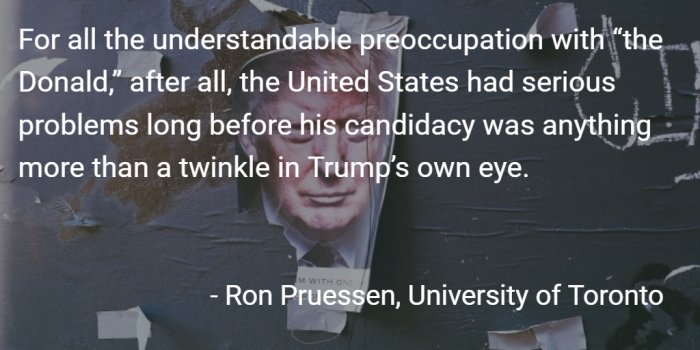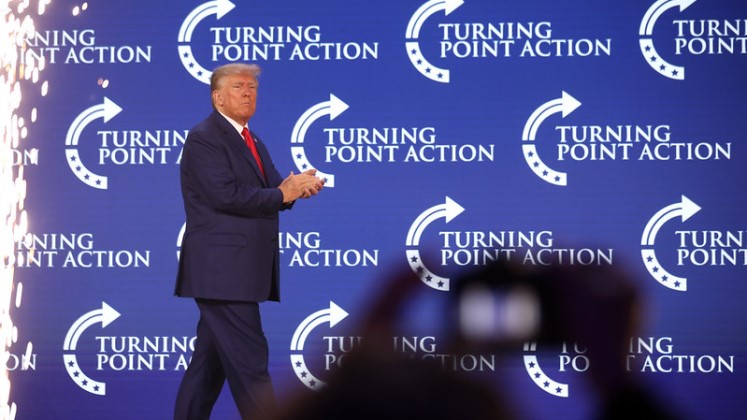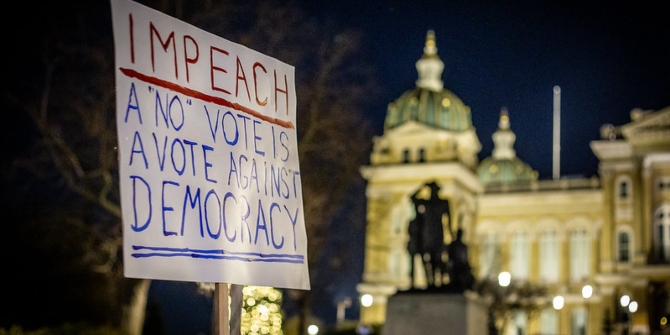 A Hillary Clinton landslide, with even control of Congress surprisingly in play? A definite possibility. Cause for relief and celebration in the face of the Trump phenomenon? Much less certain. Ron Pruessen speculates about the potentially troubling consequences of a “happy” ending for the bizarre 2016 election.
A Hillary Clinton landslide, with even control of Congress surprisingly in play? A definite possibility. Cause for relief and celebration in the face of the Trump phenomenon? Much less certain. Ron Pruessen speculates about the potentially troubling consequences of a “happy” ending for the bizarre 2016 election.
Will Donald Trump be the political arena’s Samsung Galaxy 7 phenomenon – a product so flawed (and un-pivotable) as to be unfixable? Will the market forces dear to Republicans convince them that they need to start over by pulling the 2016 model after Election Day. (Some stalwarts have already voted on this proposition with their anti-Trump declarations, creating something of a virtual counterpart to Samsung’s airport “drop-off” booths.)
Samsung has a strong enough record to suggest it may survive the Galaxy 7 calamity. It’s less clear that the “Trump 2016” disaster will be temporary for the Republican Party – or even for the country.
Once upon a time there were better Republican models on offer. Iconic leaders like Abraham Lincoln and Theodore Roosevelt gave the GOP a strong foundation for 20th century political success – and enough momentum to survive the mixed records of later standard bearers. “Mixed” as in Dwight Eisenhower’s 1950s tendency to veer from often moderate foreign policy positions toward covert operations, thoughts of massive retaliation, and early involvement in Vietnam (as well as half –hearted leadership on civil rights). “Mixed” as in Richard Nixon’s combining shrewd intellectual awareness of new global realities in the 1970s with paranoia about the loss of personal power and national prestige (plus scandal, e.g., Watergate). “Mixed” as in the way Ronald Reagan paired his talent for affability and capitalizing on the Soviet Union’s grave problems with romanticized rhetoric about “morning in America,” damaging action on deregulation and taxes, and machinations in Central America (plus scandal, e.g., Iran-Contra).
The balance went terribly askew with George W. Bush, then careened wildly with the slash and burn obstructionism of the Tea Party and Congressional GOP leaders determined to stymie Barack Obama. (Remember Senate Minority Leader Mitch McConnell’s “The single most important thing we want to achieve is for President Obama to be a one-term president”?) Now we have the 2016 crescendo: a Götterdämmerung /circus hybrid where scary clowns keep emerging from the Trumpmobile – and where many Republican leaders have shamefully applauded the performance.
Whether the Republicans can have (or deserve) a Samsung-like hope of recovery will be seen over time. Perhaps voters will have the same short memories so often discernible in American political life. Perhaps, on the other hand, Trump will have catalyzed the kind of major party demise that hasn’t been seen since the days of the Federalists and Whigs (relevant to the GOP’s own birth in the 1850s).
The fate of a political party is one thing – and it may even be that something will be gained by a Samsung 7 trajectory for the Republican Party. It’s more disturbing to contemplate the possibility of broadly national aftershocks following a Trump earthquake (one generating a Clinton landslide). For all the understandable preoccupation with “the Donald,” after all, the United States had serious problems long before his candidacy was anything more than a twinkle in Trump’s own eye. It was precisely those problems that provided recent demagoguery’s raw materials: e.g., a still fragile economy in which the middle class is losing ground and millions are worried about uncertain jobs and uncertain benefits; the frustrating (and infuriating) loss of blood and treasure in Iraq and Afghanistan twinned with the frightening challenge of ISIS; new rounds of gun violence; and dramatic sparks thrown off by racial tensions.

In theory, a strong Clinton victory could give the United States – not just the GOP – the kind of kick in the butt that might usher in a new chapter in the deeply historic American impulse to fix things that are manifestly troubling. Trouncing Trump could fuel a desire to more fully live up to promise and self-perceptions. There have been such moments before. Incomplete though they have been, efforts like Progressivism, the New Deal, and the Great Society did make the country better and stronger for millions of citizens – including those tragically short-changed by behaviors with a Walking Dead capacity in the absence of vigilance.
Given the Clinton platform and momentum from Obama’s presidency, the Democratic jackass may need the kick in the butt somewhat less than others – though even the Democrats would be wise to absorb urgency from the anger of Trump (and Sanders) supporters. Could Republicans who manage to keep their posteriors in Congressional seats get the message that extreme obstructionism has been less than a winning strategy? And/or: maybe flaming handwriting on the wall will be read by powerful private sector players, as well. Could the one-percenters, the financial sector snake oil chemists, and the CEOs/CFOs calculating the balance between cheaper labor abroad and home front consumer fury (and purchasing power) decide that this is a “discretion is the better part of valor” moment – where modifying appetites might yield something safer than Gordon Gecko gambits? And/or: might voters – the average citizens lauded in paeans to democracy –start looking more carefully, more discerningly at the hawkers’ wares on offer?
Such questions should be posed against the backdrop of both the gullibility evident during the past seven years and the country’s deeper history of impatience, intolerance, and indifference to the complexity of issues and challenges. That backdrop makes it all too conceivable that a resounding Hillary Clinton victory might – instead – yield a great sigh of relief about having dodged a dumdum bullet. There might even be a temptation to celebrate the way Americans proved that they were too smart, and too good to drink the Trump Kool-aid. There would be reason to feel relief and satisfaction, to be sure, but either or both could seriously inhibit serious action on serious problems. Cue more rage (and dysfunction) in the years just ahead.
Although it would be wonderful to be wrong about this, a wager on healthy American recovery from Trump seems less safe than betting on Samsung’s recovery from its Galaxy 7 disaster – and truly smart money may not even be betting “bigly” on that (as the Donald might say).
Featured image credit: Jake Cvnningham (Flickr, CC-BY-2.0)
Please read our comments policy before commenting.
Note: This article gives the views of the author, and not the position of USAPP – American Politics and Policy, nor of the London School of Economics.
Shortened URL for this post: http://bit.ly/2eKNJgm
_________________________________________
 Ron Pruessen – University of Toronto
Ron Pruessen – University of Toronto
Ronald W. Pruessen has served as the Munk School of Global Affairs’ Director for International Partnerships & Research and is former Chair of the Department of History, University of Toronto. His primary research and teaching interests are in 20th century US foreign policy and international relations. Early work focused on the Cold War (e.g., John Foster Dulles: To the Threshold, 1888-1952) and he recently co-edited (with Soraya Castro) Fifty Years of Revolution: Perspectives on Cuba, the United States, and the World. He is currently writing a study of the way Barack Obama’s foreign policies relate to deeply rooted American views and behavior.






